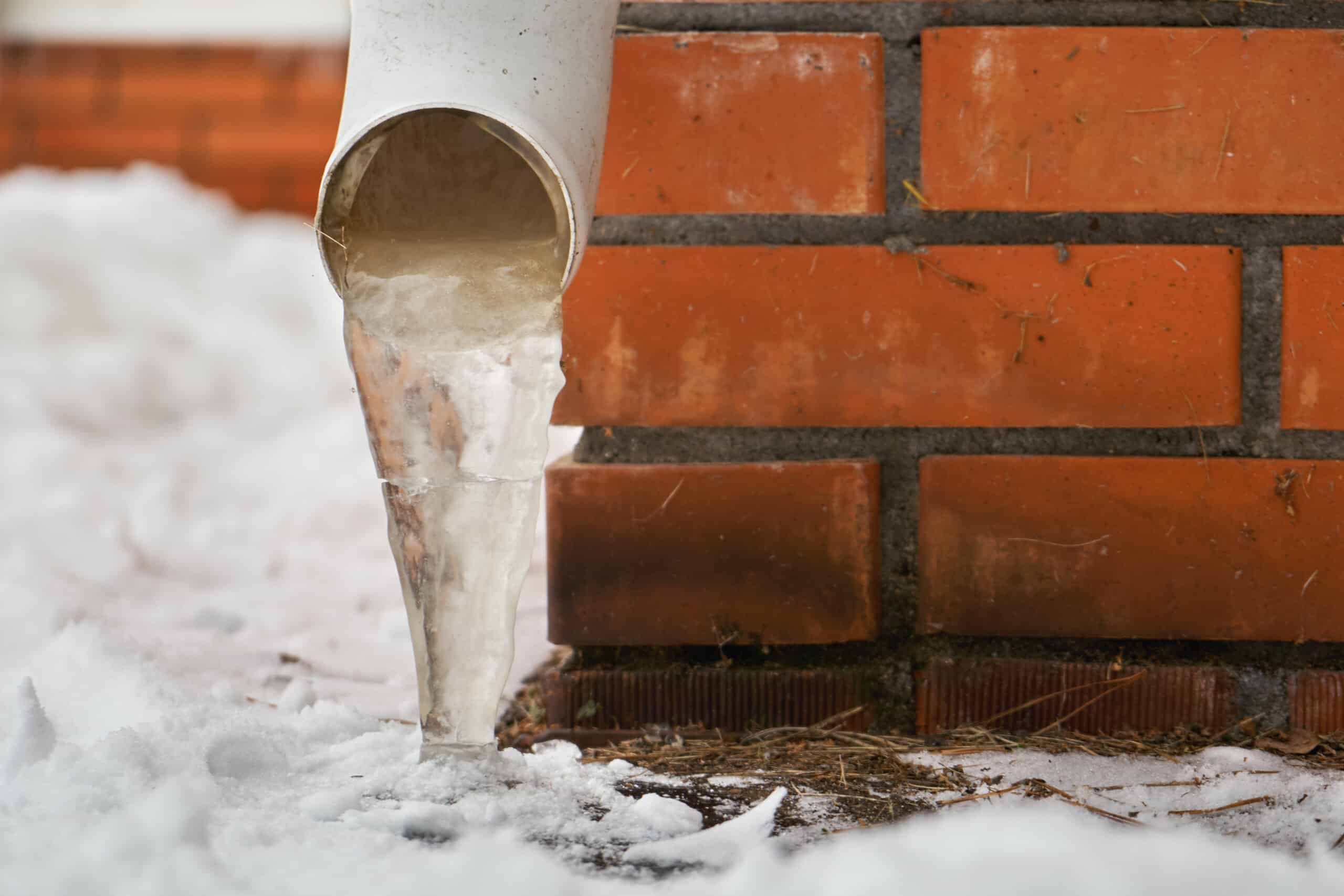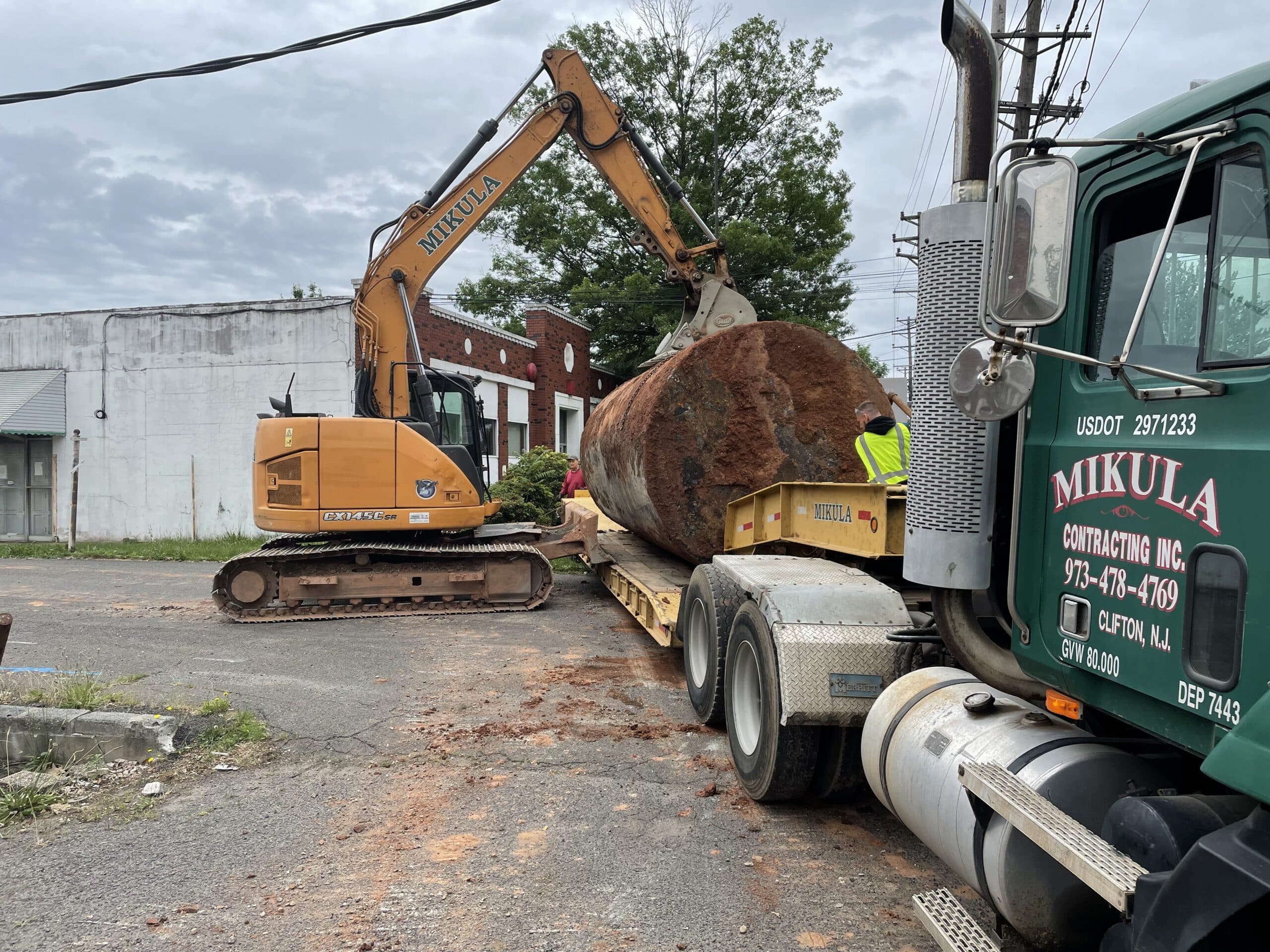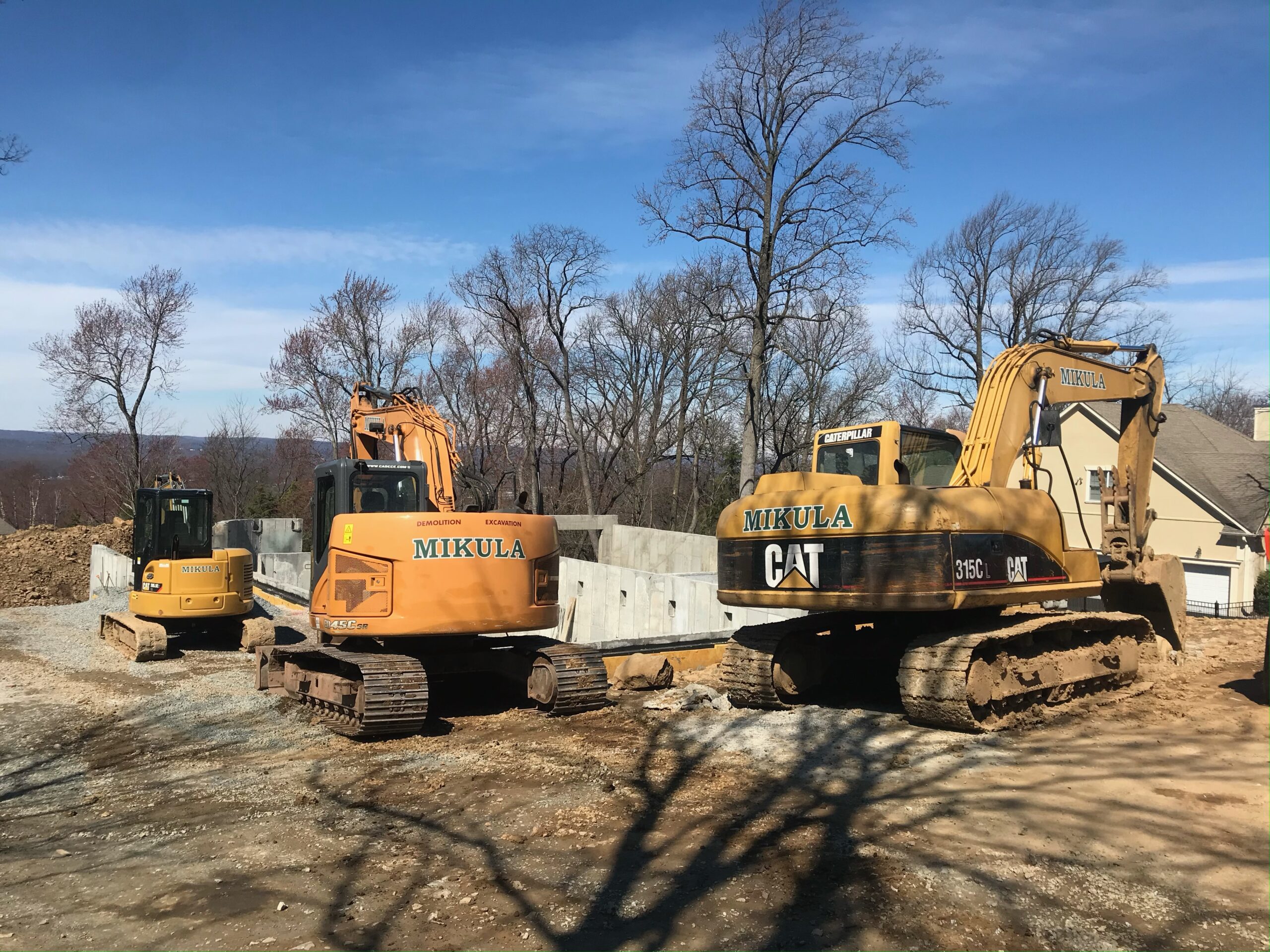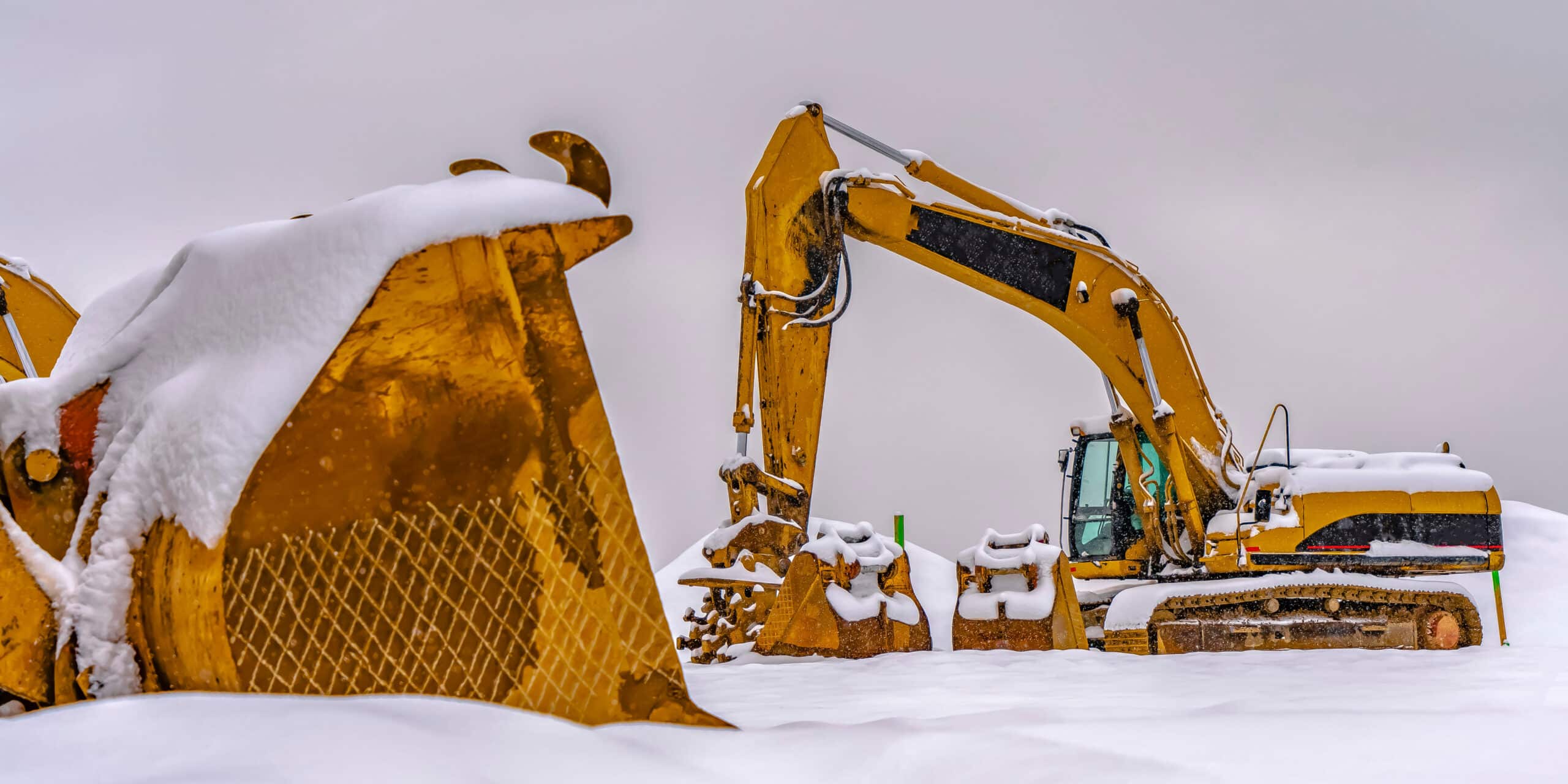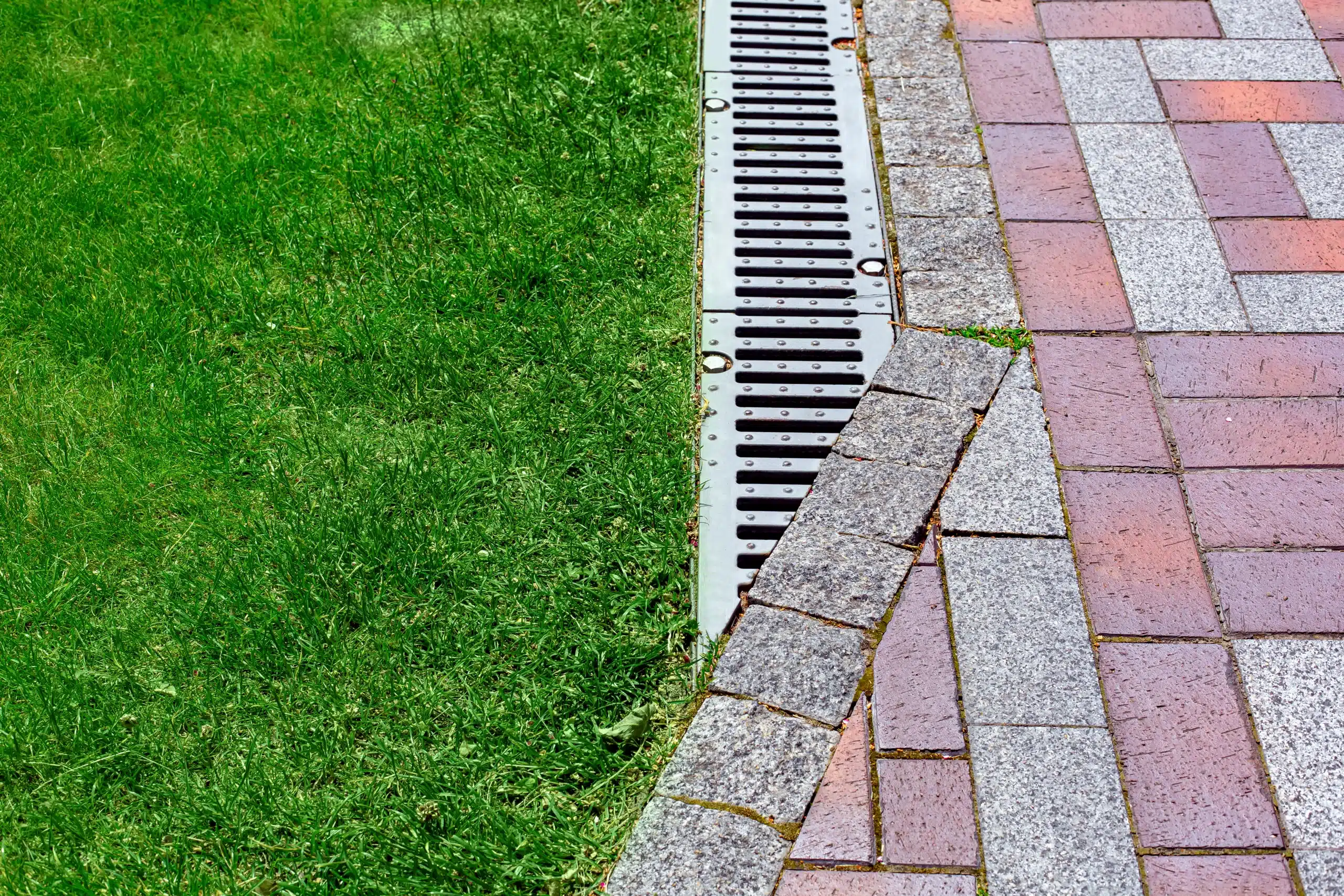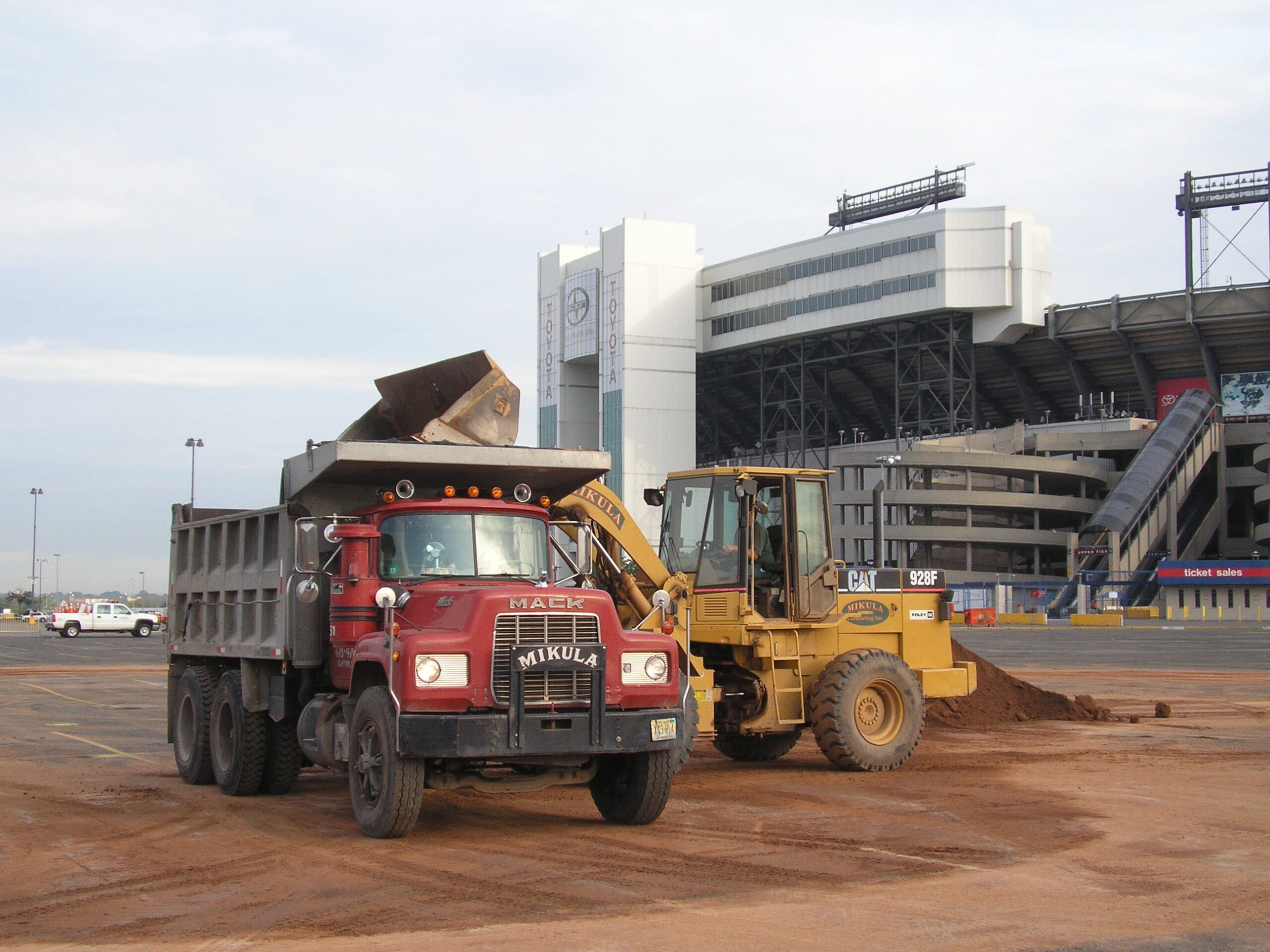Methods and Techniques for Thawing Frozen Drainage Systems
When the weather turns cold, not only is it necessary to heat your home and keep your family warm, but other factors need to be considered – such as preventing the pipes from freezing. With the right drainage services in New Jersey, you can design a system that enables the proper flow of drinking water and wastewater.
But there are still times when the freezing temperatures can cause drainage systems to be blocked. One of the problems is that when the water freezes, it has unique properties that make it expand. As a result, ice within the drainage systems can put unnecessary pressure on the pipes, eventually causing them to break.
So, if your pipes are freezing, then you need to take a proactive approach to thaw them as quickly as possible – and prevent frozen pipes in the future. If you have serious issues or recurring problems with frozen pipes, then it might be time to call in an expert team to help with drainage services in New Jersey.
A Proactive Approach to Ensuring Your Drainage Systems Don’t Freeze
The key to avoiding water issues is by proactively installing drainage systems that are designed for your unique site conditions. Proper installation matters, because it prevents the drainage system from freezing when the temperatures drop. So, instead of waiting to see if the pipes will freeze, a better solution is to work with an experienced contractor who can help with the ideal installation, depth, and pitch that will reduce the likelihood of these problems in the future.
There are different drainage systems you might consider, including storm drainage, subsurface drainage, and surface drainage. The goal is to collect and transport water effectively so it doesn’t freeze and block or damage the drainage system during the coldest months of the year.
First, an experienced contractor will evaluate the site conditions, then they can offer recommendations on the type of drainage and materials that should be used. This process involves a strategy for drainage channels and pipes, with a clear method for where the water will go. Not only does proper depth impact the flow of the water, but the ideal pitch ensures that the runoff is always moving in the direction of the drainage system. Keeping the drainage running is a key factor to reduce the risk of freezing.
The site must first be excavated properly to achieve the desired depth and pitch. Then, pipe placement can be completed. With the right installation, you are creating a permanent, long-term solution that minimizes the risk of water issues in the future.
Additional Ways to Prevent Your Drainage System from Freezing
While there are strategies that you can use to thaw frozen drainage pipes, the best solution is to prevent frozen pipes so there is no need to call for drainage services in New Jersey. Here are a few tips to keep a pipe from freezing:
- Turn up the heat so the ambient temperature in the house is a little warmer
- Let the faucets drip so the water is always running
- Seal holes and cracks around the pipes
- Place electric heating tape on the areas that are prone to freezing.
A little bit of prevention goes a long way to minimize damage and expensive repairs in the future.
Three Methods for Thawing Frozen Drainage Systems
Often, it’s not realistic to wait for the pipe to thaw naturally, because the ongoing winter weather will keep freezing temperatures for weeks or months at a time. So, you might need to intervene with DIY strategies or call for drainage services to thaw the system and ensure that the pipes are flowing correctly.
The first step is to locate the frozen pipe(s). You need to know exactly where the drainage system is frozen so you know where to focus your efforts to thaw the blockage. Typically, the frozen sections are located on an exterior wall because that’s where the pipes are exposed to the freezing temperatures outside. So, start looking there.
Also, don’t underestimate the benefits of bringing in an experienced team to help with drainage services in New Jersey. Not only can a plumbing pro offer support in identifying the location where the pipes are frozen, but they can also assist with effective methods for thawing the frozen drainage system and preventing these issues from happening again in the future.
1. Salt
Did you know that salt lowers the melting point of ice? As a result, you can return ice to liquid even when the conditions are cold enough to otherwise keep ice solid. If you want to thaw the frozen pipe more quickly, then a salt application can be effective.
If you have cold weather and the plumbing system isn’t draining right, try putting salt down the drain that is being affected. A tablespoon of regular salt is often sufficient. Simply pour it down the drain and leave it alone so the salt can start acting on the ice.
2. Electric Heater
Another way to thaw a frozen pipe is to increase the ambient temperature around the pipe. For example, you can thaw the pipes by placing a space heater or heat lamp nearby to warm up the room.
If you know the specific area of the pipe that needs to be thawed, then heat guns can also offer fast and effective results since you can direct the heat to one part of the pipe. Even a hair dryer on the lowest setting can be sufficient – so there is no need to buy special tools.
Another option is to place a heating pad on the pipe. An electric heating pad offers consistent warmth to help the ice melt. Or, you can place a hot water bottle over the pipe for the same effect. You can easily create a homemade water bottle using hot water in a sealed gallon-sized Ziplock bag.
If you are using any type of heat lamp or space heater, remember that these tools can be a fire hazard, especially if there are any open flames. So, it’s best to stay nearby. Never turn the space heater up and walk away.
3. Garden Hose
It’s essential to drain the garden hose before winter begins. But if you forgot to drain the hose and you find a frozen hose after the temperature drops, it is relatively simple to thaw the hose. For example, use a hair dryer to apply heat to the outside of the hose so that the ice inside will start to melt. It’s best to use the lowest setting on the hair dryer because the hottest setting can cause the rubber to melt.
Other pipe thawing methods listed above can also be used to thaw a garden hose, including a heating pad on the frozen section or placing the hose in front of a space heater.
Speak With a Professional in New Jersey Drainage Services
When should you call a professional plumber to help with drainage services in New Jersey? If you need assistance with your plumbing system or thawing frozen pipes, then it is always a good idea to bring in the experts.
Mikula Contracting is here to help with everything that you need. Contact us at your convenience to learn more about available services, including residential drainage, commercial drainage, and more.
What is the Process of Scanning for an Oil Tank?
If you own an older property in the Northeast, are there any underground heating tanks in the area? A typical home inspection doesn’t look for these tanks, so it might make sense to look into oil tank scans to locate any hidden tanks on the property.
It’s important to know if you have an underground oil tank because an oil leak can result in serious financial and health consequences in the future. So, you can take a proactive approach to prevent these issues from occurring.
Too often, forgotten oil tanks are left sitting for years, unused after the home was upgraded to a more modern HVAC system. Sometimes, homeowners and home buyers have no idea that they have a buried tank on their property. Oil tank scans are an effective solution for finding these old tanks and helping you avoid serious and expensive issues later on.
Choosing the Type of Scanning Technology
If you have a magnetometer, is it an effective solution for finding an oil tank on site? Unfortunately, this method is not good enough because magnetometers can detect any type of metal but can’t identify the difference between the two signatures.
For example, if you have concrete that contains wire mesh and a tank buried below, there is no way to distinguish the difference between the mesh and the tank. So, a thorough oil tank scan determines whether there are storage tanks and if proactive measures are necessary to remove the tank.
Ideally, hire a contractor offering oil tank scans who uses multiple detection methods. Here is an overview of the common technology used for oil tank scans.
Ground-Penetrating Radar (GPR)
This technology uses radar that sends high-frequency radio waves into the ground. The information that comes back provides a great deal of data in a short amount of time. Not only can GPR be useful in identifying subsurface objects, but it’s also possible to identify changes in the material properties (such as cracks or gaps).
Ultrasonic Testing
Ultrasonic testing is beneficial for oil tank scans because it offers unique information about the thickness of the steel. This information helps you determine whether corrosion is occurring so you can decide if the risk of an oil spill is so great that the tank needs to be removed. Typically, corrosion occurs from the inside-out, which means it’s possible to use ultrasonic testing to identify issues before the oil spill occurs.
Magnetic Flux Leakage (MFL)
MFL is a common technology used for oil tanks and other applications in the petrochemical industry. This magnetic method detects wall loss, pitting, and corrosion in steel structures. So, it’s possible to determine the structure and integrity of an underground oil tank without digging everything up.
Preparing to Do the Scan
Not only can homeowners benefit from oil tank scans, but these services are also helpful for home buyers who are preparing for a real estate purchase. A visual inspection isn’t enough, because you can’t get eyes on any oil tanks or hidden objects underground. Hiring an expert team is an essential step that should be part of your due diligence during the inspection process.
Collect the Data
The contractor will do a bit of research before completing the oil tank scans. For example, they will look at the date of construction to determine if there is a possibility of the oil tank being on the property.
Data is collected through visual inspection and using the different types of technology listed above. These tools provide data about where the oil tank is located, as well as any other buried objects that are on the property (such as fill pipes, vent pipes, and more).
Analyze the Data
After the oil tank sweep is done, it’s time to look at the data to determine whether the tank needs to be removed. The data is reviewed to determine whether there is a risk of an oil leak. It does so by showing us whether the tank has weak points or areas where the oil might already be leaking.
Make a Decision
If it’s determined through oil tank scans that your tank is leaking oil, then it’s important that you take action as soon as possible. Learn about the environmental and health impacts of an oil tank leak, and you’ll see why you don’t want to delay tank removal. These issues can pose serious threats to your property and loved ones. Even though it is a cost to remove the oil tank, it’s worth the investment to avoid even bigger issues in the future.
Do You Need an Oil Tank Scan on Your New Jersey Property?
Are you wondering if you have an oil tank on your property? Or, maybe you know there is a buried oil tank, and you want to make sure that it isn’t leaking. If you need oil tank scans, then Mikula Contracting is here to help. We offer full-service solutions for residential and commercial properties. Call today for a consultation and estimate.
What is a Land Improvement Contractor?
Hiring a land improvement contractor means that you are working with a team that not only moves the soil, but approaches the project with the goal of protecting the environment. If you need help with earthwork, excavation, or other related services, then it makes sense to call a New Jersey land improvement contractor for help.
What Does a Land Improvement Contractor Do?
When you hire local enterprises in land improvement contracting, there are many different services available. These services can help businesses and homeowners with building, growth, and expansion, while simultaneously protecting the environment. Our contractors strive to improve available services in a way that preserves natural resources.
Common services from a New Jersey land improvement contractor include:
- Grading: The level and slope of the soil matter because when precipitation comes down, the grading affects where the water goes. Grading and sloping contractors keep the water moving away from the structure or house to prevent damage to the building. They do so through angle and design of the earthwork and landscaping features, which help surface water flow away instead of toward the home or building.
- Excavating: Hiring an excavation contractor is an important step in the construction process. Excavation services are customized to each work site and often involve the removal of soil or rocks to prepare the ground for construction. Other examples of excavation include trench digging and splitting.
- Site Preparation: Before construction, it’s important to make sure that the ground is ready for a foundation placement. Site preparation typically includes a multi-step approach incorporating a variety of contractor services, such as grading, leveling, drainage, demolition, clearing land, site surveying, earthmoving, and more.
- Drainage: A New Jersey land improvement contractor assists with drainage as part of the construction process. The goal of these services is to remove water from the property and redirect the water to proper runoff locations, helping to avoid building damage and oversaturation of the soil.
These services are available in many locations and construction conditions, including cities, ranches, farms, and even rural areas. The professional practices implemented in construction are designed to preserve water and soil in the area.
What is LICA?
The Land Improvement Contractors of America (LICA) organization was started in 1950 by a group of contractors who were proactive about preserving water and land resources. Over the years, chapters have continued to spread throughout the country, with the organization ultimately reaching from coast to coast.
LICA's objectives focus on one priority: conservation. The organization brings together people who have similar interests in protecting the environment. The team is working together to encourage high standards through education and safe practices. Not only do LICA contractors follow legislation and regulations, but they go above and beyond to ensure that the land is being protected.
Benefits of Working with a Contractor Involved in LICA
When you need site preparation and other services, why should you hire a New Jersey land improvement contractor involved with LICA? You need professional conservation of soil services, allowing you to complete your project and protect the environment at the same time.
LICA contractors receive training in the latest methods for construction and environmental preservation. For many years, LICA contractors have been working hard to establish the best practices that allow community growth and expansion while also protecting the surrounding natural resources.
Hiring a professional contractor ensures that the excavation, grading, and site preparation are completed safely and efficiently. At the same time, natural features are maintained whenever possible. We hold tight to the highest levels of integrity to go beyond the basic laws and regulations.
Are You in Need of a New Jersey Land Improvement Contractor?
Do you need to hire a New Jersey land improvement contractor? We invite you to reach out to our team at Mikula Contracting. We’ve been serving the community for years and offer a wide range of services: grading, excavating, drainage, and more.
We work with dedication to our customers while also prioritizing environmental protection at the same time. Mikula Contracting has received the New Jersey LICA Excellence in Safety Award multiple times. Dennis Mikula is also the President of the Board of Directors of New Jersey LICA.
Contact us at your convenience to learn more about the services we offer and our involvement in NJLICA.
Excavation and Stormwater Management: Best Practices for Environmental Protection
When stormwater runoff is uncontrolled, it has the potential to cause property damage and can also affect lakes, rivers, and estuaries in the area. Not only does the water move to different places, but it can also carry sediment and pollutants that affect the habitats and properties.
A proactive approach to water quality management is the best solution to prevent these issues. The ideal solution is to hire a New Jersey excavation contractor to assist.
Stormwater Runoff and Its Environmental Impact
Not only is stormwater runoff a concern for property damage, but it can also result in problems with pollution in larger bodies of water. For example, the polluted runoff water can move into the oceans, lakes, ponds, and rivers, causing unhealthy conditions in these areas. Stormwater can carry debris and disease, including viruses and bacteria that could make people sick when swimming in polluted waters.
As stormwater moves from one place to the next, it picks up oil, fertilizer, trash, organic materials, construction chemicals, and other products. The water moves through the ditches and storm drains, spreading these contaminants along the way.
Managing stormwater runoff is essential for preventing water pollution, decreasing the risk of flooding, and protecting important bodies of water (including drinking water).
Stormwater Best Management Practices (BMPs)
In our modern world, there are best management practices for stormwater that can be used to mitigate these issues and protect water resources. Both structural and non-structural methods can be implemented, depending on the vegetation, soil, and other unique characteristics of the site.
Non-Structural
Non-structural BMPs work to prevent stormwater runoff from occurring. These systems are often more cost-effective and efficient compared to structural BMPs. Examples of non-structural BMPs include:
- Conservation Areas: If an area is sensitive to storm runoff, then it can be protected by designating the space as a conservation area. This approach not only preserves the immediate area, but also offers protection for other downstream areas.
- Watershed Planning: This approach is a “bigger picture” way of thinking. The process looks at the whole watershed, from the highest points to where the water moves at the lowest points. Then, agreements and partnerships can be established between property owners and stakeholders to solve all of the water problems together (instead of only addressing individual issues as they arise in the process).
- Avoiding Soil Disturbance: The goal is to avoid the need to disturb the soil through vegetation removal or grading. When the natural topography is preserved, it also reduces the need for maintenance and landscaping in the future.
- Laws and Regulations: Government involvement can be helpful by requiring best practices on construction sites and properties in the area. These ordinances help to reduce the sources of contamination. For example, construction sites must follow specific procedures for waste control.
Structural
Here are examples of structural stormwater management practices that can be used. These structural BMPs are designed to filter water after it is generated and move it in the ideal direction.
- Stormwater Wetlands: These are shallow areas designed to manage runoff during peak flow periods of time. One example is using temporary water detention basins by retrofitting them for this purpose.
- Infiltration Basins or Trenches: This is a system that allows the water to drain down, from the surface into groundwater collection areas. Basins are larger areas to hold the water, while trenches have a linear design. They are built with soil that is highly permeable to promote drainage.
- Retention Basins: These basins hold a certain level of water permanently, and have the capacity to hold even more when the rainwater comes through.
- Swales with Grass: These shallow channels are designed with gentle sloping to guide the runoff to specific treatment areas.
- Detention Basins: This method of stormwater management involves the use of natural features or excavated depressions to control stormwater movement.
- Rain Gardens or Vegetation Strips: These are areas with planted vegetation that improve the way water is soaked up into the soil. They act as “buffer strips” and often contain flowers, trees, shrubbery, grass, and more. The vegetation helps to filter the runoff to remove pollutants before the runoff reaches a body of water.
- Green Roofs: If a building roof is flat or slightly sloped, it can be planted with shallow vegetation. The presence of plants on the roof helps to minimize runoff because the vegetation soaks up the water.
- Cisterns and Rain Barrels: Cisterns and rain barrels are containers that gather water from downspouts, to prevent pollution and contaminants from moving into the environment. After this water is collected, it is reused for other purposes including landscaping, toilet flushing, irrigation, or washing.
- Sand Filters: In this solution, a sandy area is placed on the surface or below the surface to filter out pollutants. The particles that are collected absorb and settle into the sand, which can remove as much as 80% of the solid contaminants. If sand filters are below the surface, they usually have a containment with concrete shells to keep the sand in place.
- Pavement: If you need to place pavement in an area, make sure to choose a porous material. The paving material is permeable, which means that rainwater can drain down instead of running across the surface. As the water moves through the pavement, it also helps with filtering pollutants.
How to Incorporate Stormwater BMPs into Your Excavation Project
Each site is unique, which is why there isn’t a one-size-fits-all solution for every excavation project. If you are preparing for grading, excavation, or other construction services, then it’s essential to talk to a New Jersey excavation contractor for personalized recommendations as to which stormwater best management practice is right for you.
Not only do we provide suggestions for optimizing the results from your excavation project, but we also consider stormwater runoff and environmental factors as well. Looking at the bigger picture is essential to protect your property while also preventing pollution in the surrounding areas.
Speak With an Experienced New Jersey Excavation Contractor
If you have questions or need assistance, then Mikula Contracting is always here to help. We are proud to be a trusted New Jersey excavation contractor, and our team also provides many other related services including residential drainage, commercial drainage, environmental cleanup, grading, demolition, and more. Contact us for a personalized consultation and estimate for your project.
Winter Emergency Response Planning for New Jersey Construction Sites
Construction projects need to continue throughout the year, but weather conditions can impact a variety of factors on the job site. When a big snowstorm rolls into the area, it can affect the schedule, budget, and even the health and safety of the team. At Mikula Contracting, we always try to coordinate projects that make sense seasonally that way we work with and not against the weather.
With that said every experienced contractor knows that winter construction work can pose unique threats to workers and contractors. During the winter months, it’s essential to take proactive steps to keep the construction sites safer. Not only do these measures protect your team members, but they also help to keep the project on schedule to avoid costly delays.
What actions are you putting into place this winter season? Here are a few effective recommendations to help with your planning and preparation.
Identifying Potential Winter Hazards on Construction Sites
Even before the snow starts falling, hold a preseason meeting to address topics that might impact the project in the colder months. All contractors, clients, workers, and management must be involved in this conversation.
The team can work together to discuss factors such as materials availability, site mobilization, upcoming activities, tasks, and an assessment of potential hazards and dangers.
Since these hazards change depending on weather conditions and the nature of each construction project, hazard assessment isn’t a one-time activity. Ongoing assessments and evaluations are necessary to identify and prevent any other dangers that might come up during the course of construction.
Examples of potential hazards on a construction site include:
- Potholes and poor road conditions
- Reduced traction
- Slick surfaces that can cause falls
- Heavy snow
- Ice and snow falling from the equipment and rooftop
- Limited daylight hours
- Frozen ground
- Reduction in visibility due to snow or decreased light
- Power lines down
- Utility services disrupted
- Large obstacles hidden or buried by ice or snow
Ongoing monitoring of weather conditions is essential to make real-time adjustments on the job site as needed. Keep in mind that longer-term weather forecasts aren’t accurate, so it’s difficult to plan for weather conditions pre-season. Instead, updated work schedules need to be managed continually as new information becomes available. In addition, the health and safety of employees are more important than the project timeline, so if the weather is not cooperating at Mikula Contracting, we do not put our employees at risk for the sake of the job.
Equipment and Material Precautions for Cold Weather
The construction site should have plenty of snow removal equipment, including shovels, de-icing solutions, and other tools to remove snow from the walkways and driving paths. Sometimes, heavy equipment, such as a skid steer, can be retrofitted with snow removal equipment so the construction sites can be cleared quickly and efficiently after a big snowfall.
Also, consider materials and equipment to keep your team members warm in this weather. Everyone should have personal protective equipment (PPE) as a last line of defense to protect against the risk of injuries, hypothermia, and frostbite.
The best solution is to have workers wear clothing in layers. The layer closest to the skin should be a thermal underlayer, such as wool socks, a top, and pants. Insulating layers are added on top of the underlayer. Then the outer layer helps to protect against wind and moisture, such as jackets, windbreakers, wind-blocking pants, hats, and face masks.
When PPE is used in layers, the workers have the option to shed or add layers when the temperatures change. For example, if the sun comes out, then workers can shed the insulating layers to prevent excessive sweating. If a person sweats too much and the temperatures drop again, then it can increase the risk of hypothermia because the underlayers are wet and the body temperature drops.
As you are choosing equipment and PPE for workers, make sure that team members have optimal dexterity, vision, and mobility at all times. Consider the work environment and necessary tasks when choosing gloves, boots, eyewear, and other equipment.
Finally, keep in mind that vehicle and equipment maintenance needs are more demanding in the winter. Heavy equipment requires regular checks for safety, looking for ice buildup, snow, frozen pipes, cracks, and more. Ensure the fluids are at optimal levels and let the vehicle warm up before starting work.
Environmental Compliance and Winter Construction
As you are implementing winter construction measures on the job site, it’s important to keep environmental compliance in mind. For example, de-icing products can help melt frozen surfaces, but some of these products have toxic ingredients that can seep into groundwater. Additionally, take the time to research before the winter comes so you are prepared with the proper tools and products to stay in compliance based on the forecasted work.
After heavy snowfalls, have processes in place for snow removal, sanding, and de-icing. Ensure these responsibilities are assigned in advance so the right team members clear the work site before the rest of the team shows up each day. It’s also important to read labels and understand what is appropriate to use for snow removal and de-icing.
Additionally, trailers and buildings should be properly winterized and fitted with doors and windows that latch securely. In sub-zero temperatures, utility systems and piping must be protected from the cold temperatures. For example, these systems might use anti-freeze treatments or heat trace insulation to prevent freezing.
Always prioritize snow removal on walking paths and roadways. Anywhere people will be moving back and forth throughout the day is a place where there is an increased risk of an accident.
Key Components of a Winter Emergency Response Plan
During the planning process, make sure to set aside budget and resources for managing the winter conditions and protecting your team. Create emergency response systems in case an unexpected event happens, including evacuation plans. Have a site-wide alert system if notifications need to be sent out. A PA system can be used, but also have a plan in place for communicating with vehicle operators and remote workers who also need to receive notifications about severe weather conditions.
During bad weather, emergency first responders are often delayed in their arrival. So, on-site workers need basic training for administering first aid if needed.
Have emergency equipment on-site at all times, including a fire extinguisher, torches, first aid kits, blankets, food, a radio, and more. Not only do these items need to be ready on the construction site, but it is also good to place emergency equipment in every vehicle.
Keep Your Construction Site Safe During the Winter
At Mikula Contracting, we implement the best strategies to maintain safety on your construction site. Regardless of the weather conditions or the time of year, you can have confidence in knowing that we are maintaining the highest levels of safety and care. Contact us for more information about available services.
Five Environmental Considerations in Seepage Pit Design
A seepage pit often goes hand-in-hand with a septic tank system, creating a porous masonry area where household waste can be collected and gradually seep into the ground. If a conventional septic system won’t work or there isn’t access to a main sewer system in the area, then a seepage pit can be a great alternative.
While the use of seepage pits can be helpful, there are specific considerations that need to be made to protect the environment. The location, structure, and overall design of the seepage pit must be strategically planned to avoid toxic waste that can harm the surrounding areas.
Seepage pits are designed with walls to contain the wastewater, then filled with gravel to allow for optimal draining. Additionally, the gravel is beneficial for reducing clogging by minimizing the dirt that comes in contact with the walls.
Here are a few essential environmental considerations that need to be addressed when designing and installing a seepage pit.
1. Location and Site Selection
Sufficient space and an ideal location must be selected for the seepage pit placement. When selecting a location, it’s important to consider other features and buildings in the area. For example, the rule of thumb is that a seepage pit should be more than 100 feet from the nearest well to avoid water contamination.
If other buildings are in the area, then the seepage pit must be at least 20 feet away. The area between the seepage pit and the house must be unobstructed. Also, a minimum of 10 feet needs to be between the lot line and the pit.
You should also consider the area's slope in relation to the house and other buildings. Never build a seepage pit where the slope runs down to the house. Instead, the house should be higher than the pit, allowing gravity to support the natural processes.
2. Soil Permeability
How well will the wastewater permeate into the soil? If the soil is more permeable, then it means that the seepage will be more significant. As a result, a smaller seepage pit might be sufficient. The permeability of the soil plays an integral role in the seepage process and the way everything can filter through the pit.
The best type of soil to support seepage is a more sandy material. When you pick up a handful of the soil, you will see that it will easily crumble and clods will fall down. If the soil is dry, hard, dense, or difficult to dig into, then it means that the soil is nonabsorbent.
Check the soil on your property by turning a few shovels of soil in several areas. When you find an area with the ideal type of soil, then consider digging a small hole to test the effectiveness before undertaking a full seepage pit installation.
3. Size and Depth
The depth of the seepage pit depends on the soil conditions in the area. It’s also essential to know where the groundwater is located. Seepage pits must be located more than 2 feet above the groundwater. If there is impermeable bedrock, then the seepage pit must end at least 5 feet above this rock.
4. Vegetation
Evaluate vegetation in the area near the seepage pit. Because hazardous waste can be present in the runoff water, be careful to avoid water that runs into areas with trees and other types of vegetation. These vegetation features need to be protected so the trees and plants aren’t killed off by the drainage.
5. Regulatory Compliance
Various regulatory requirements must be met in accordance with area permitting and compliance needs. For example, your municipality might have specific guidelines for system components, necessary clearances, or other specifications that must be met in the design of the seepage pit.
Most property owners don’t know about these compliance requirements, which is why it is essential to lean on the experience and recommendations of a knowledgeable contractor.
Not only are you hiring a contractor to help with soil testing and seepage pit excavation; but the right contractor, such as our team at Mikula Contracting, can also offer advice about obtaining the necessary permits and other requirements before construction can begin. Going through the proper channels and local municipalities helps to minimize the risk of fines and penalties for the project.
Let Mikula Contracting Help
Whether you are installing a septic system or adding a seepage pit, it pays to hire the experts. Many different factors need to be considered to ensure the effectiveness and safety of this system.
Our team at Mikula Contracting offers seepage pit installation and upgrades, and we also provide a full range of other services for your property, such as soil remediation, excavation, and more. We invite you to reach out for a consultation to discuss the possibilities with an expert team in the industry. We are always here to help!
Five Drainage Best Practices for Commercial Properties
A good system for managing stormwater is essential for your commercial property. The water needs somewhere to go. Otherwise, drainage issues could damage your building or the surrounding community. Whether building a new property or working on improvements for your current property, don’t underestimate the importance of commercial drainage services in New Jersey.
These systems are designed to handle water during and after a storm. The goal is to not only protect your property but also ensure that the water ends up in the right location without polluting the water supplies in the area.
Here are five important steps that should be followed when you are working on commercial drainage services in New Jersey.
1. Conduct a Site Assessment
In order to design the ideal solutions for your property, it’s essential to evaluate the site and determine what is needed. This site assessment is the first preparatory step for commercial drainage.
We provide in-depth site assessment solutions, including camera inspections to see what is happening in the current drainage systems. If necessary, soil testing and other evaluations can be done to give us a better idea about the current conditions.
We will look at water damage that has already occurred due to current water issues and then determine solutions to prevent water damage and flooding again in the future. The goal is to determine what type of water drainage system is necessary for your property. At the same time, we can be proactive about designing a system with simple upkeep when it is time for regular maintenance.
2. Create a Plan for the Drainage System
Once we understand the specific issues being addressed with your commercial drainage needs, it’s time to create a plan. Our team offers personalized solutions for every property owner, giving you the confidence in knowing that this plan is custom-designed to the unique needs and features of your property.
Our experts will offer recommendations for the ideal solutions. We always work hand-in-hand with property owners, architects, and engineers to consider the best solution that works with your preferences, budget, and other factors that need to be taken into consideration. The goal is to create a long-lasting system that works now and will maintain durability for many years in the future.
3. Select the Right Drainage System
Each site is unique, which is why there isn’t a one-size-fits-all solution for commercial drainage services in New Jersey. We work with property owners in determining the ideal drainage systems based on the layout and unique considerations for the property. Additionally, our team can collaborate with other contractors supporting the project.
The most common types of commercial drainage systems include:
- French Drains: These systems are designed to subtly drain lawns and grass using a trench and perforated piping. The pipes aren’t visible; they are usually covered with gravel to help with drainage. If you want to hide the drain completely, then there is an option to place topsoil and grass over the French drain system.
- Trench Drains: These commercial drainage systems can be used for both indoor and outdoor draining in commercial buildings. They are ideal for flat surfaces like parking lots, driveways, or loading docks. A channel gathers the water and redirects it to a perforated gate. Standing water can collect in this large, flat area without proper drainage.
- Siphonic Drains: These systems are designed for commercial buildings with flat roofs. A baffle is placed on top of the system to prevent air from going into the system. Since the drains have lower atmospheric pressure, they can pull the water in faster. The water moves into the drain and then is redirected out of the building or through a storm basin.
- Grading: Don’t underestimate the importance of good grading to manage water runoff. Consider how the grounds around the building are laid out. If necessary, make changes to the grading and/or landscaping so the water slopes away from your property instead of towards the foundation.
- Gutters: When the roof is slanted, gutters can be an effective solution for your commercial drainage needs. The purpose is to catch the water in the gutters so it doesn’t run off the roof and affect the foundation below. The water runs through the gutters until it reaches a downspout. This system makes it easy to move the water wherever you want it to go for drainage.
4. Invest in Maintenance
Not only do you need commercial drainage services, but ongoing maintenance also ensures that your systems are always working properly. If you own a commercial building, mark your calendar to hire experts for inspection and maintenance services for all your drainage systems. This proactive approach helps you stay ahead of any potential issues and prevent flood and water damage to your building.
5. Consult with a Professional in Stormwater Management
At Mikula Contracting, we are here to help with commercial drainage services in New Jersey. Please note that here at Mikula we can handle the installation of your drainage system however you will need to receive plans from an architect or engineer for our team to make that happen. If you are interested in more information, then reach out to our team to schedule a consultation.
Understanding Floodplains for Your Property
When it comes to stormwater management on your property, it’s essential to not only evaluate your site – but also to look at the surrounding land. If there is a floodplain or water source nearby, then you need a good water management system in place to prevent a property flood. Not only is water management an important element for building code, but these proactive steps also help you avoid many issues in the future.
What Is a Floodplain?
A flat area near a natural water source, such as a stream or a river, is known as a floodplain. The floodplain is located from the riverbanks and then out to the edges of the valley.
There are two parts of a floodplain:
- Floodway: The main channel where the river is flowing, known as the floodway. Water can be running through the floodway all year long. Sometimes, the floodway is seasonal if water is only running for part of the year and the channel is dry at other times in the year.
- Flood Fringe: The second part of a floodplain is the flood fringe, which extends from the banks of the floodway to the edges of the river valley (known as the bluff lines or valley walls). This is the point where the valley floor starts to increase in elevation and move into the bluffs.
Knowing if your property is in or near a floodplain is important because there is likely an increased risk of flooding. \ So, if you are in high-risk flood zones, you should look into stormwater management services and drainage options, and ask your insurance agent about flood insurance rate maps to see how your rates will be affected. Additionally, you should also look into what systems your municipality has in place to manage water to see if it is even an issue. This will also allow you to see if there is something you're able to do on your property to mitigate any possible issues.
How Are Floodplains Formed?
Floodplains develop naturally, and two main things are involved in this process. First, erosion can play a role because the soil in the area is worn away with the movement of the water coming through the floodway. As the river curves from side to side, it erodes the earth and carves its path over time.
The second way floodplains are formed is through aggradation (also known as alluviation). With this process, earth material can build up over time because sediments are deposited by the river. So, the land elevation can increase slightly as the sediment is accumulating. Typically, this occurrence happens when the river is shallow and wide. For example, it’s common for these types of rivers to have deltas.
Because floodplains can change over time, the flood elevations can also shift depending on what is happening with the river. The conditions are different from one year to the next, depending on how much rain and snow is coming down in the local area as well as upriver.
Currently formed floodplains create a special flood hazard area, especially since the conditions can change based on the time of year. So, any property owners in the area must be diligent about stormwater management to prevent water damage and other associated issues.
How Does a Floodplain Work?
As the water moves through the area, the river or stream adjusts the layout of the soil and sediment. Floodplains work by flattening the area overall while meandering back and forth to create natural curves where the water is flowing. This is why if you look at a river in a flat area, you can see the s-shape of the river as it moves from side to side.
Floodplains are constantly evolving based on the amount of water and the way the water is moving through the area. If your property is near a floodplain and you feel like the water is far away, it’s still essential to be proactive about stormwater management because the conditions can change at any time. The risk of flooding is always higher for buildings in a floodplain compared to properties at higher elevations.
Types of Properties That Have or Need Floodplains
If you know that your property is near a flat area in the valley or there are floodplains around, then it’s essential to look at requirements and floodplain management. Stormwater management systems are an excellent investment because they can control and move the water if a storm comes in.
You can look at maps of flood zone designations to see how much risk there is in your local area. Most property owners don’t have training or expertise in stormwater management, so the best solution is to consult with an experienced contractor about your location and the potential risk you are facing. Then, a water management system can be designed and installed, giving you the peace of mind that you can control the flooding if it occurs.
The Benefits of Floodplains
Even though there is a moderate risk of flooding for properties in floodplain areas, there are undeniable benefits from these natural features. Some of these floodplain benefits include:
- Water Management: Floodplains work by storing flood water and slowing the runoff, which can help prevent the water from running to different locations. So, there is natural erosion and flood control in place.
- Environmental Protection: The natural formation of floodplains helps to protect wildlife and fish in the area. These animals are protected and live in an environment that is ideal for their unique needs.
- Recreational Activities: Often, floodplains provide an excellent location for fun recreational opportunities, such as bird watching, fishing, and even boating (depending on the depth of the water).
- Ground Water: Because of the way floodplains manage the water, it has a positive impact on recharging the groundwater.
Stormwater Management Is Important – Mikula Can Help
What questions do you have about stormwater management for your property? Mikula Contracting is here to help! We’ll evaluate your site, determine flooding risk, and offer suggestions to create the ideal stormwater management system for your unique needs. We have experience with both residential drainage and commercial drainage projects. Reach out to schedule a consultation and learn more about these professional services.
What Updated FEMA Flood Maps Could Mean for You as a New Jersey Resident
Did you know that FEMA recently released new mapping for the Coastal Flooding Sone and Advisory Base Flood Elevations? These updated maps affect communities in both New Jersey and New York, along waterways in the area, as well as the Atlantic Ocean coastline. If you own property in the area, it’s a good idea to look at the maps to determine if you need updated drainage systems.
The goal is to provide more awareness so property owners and homeowners can be proactive about understanding flood risk. When you know that you are in a moderate or high flood risk area, you can consult with a contractor who offers drainage services in New Jersey to identify the ideal solutions for preventing water damage to your building and property.
What Is a Flood Map?
A flood map is designed to help the community see the risk of flooding throughout the area. The map is marked with specific flood zones, as well as other details that indicate a risk of water issues. Base flood elevation and floodplain boundaries can be key indicators to determine which areas have the highest risk of flooding if a big storm comes through and water levels increase.
Regardless of your location on the flood map, there is always some risk of flooding. Even if a flooding natural disaster is unlikely, there could potentially be water damage from plumbing issues or nearby properties. So, all New Jersey property owners should be proactive about their drainage system in case something happens unexpectedly.
Flood maps list both low- and moderate-risk zones, as well as high-flood-risk zones. The flood risk is clearly marked in sections on the map and often color-coordinated depending on the specific flood map you are looking at.
On FEMA flood maps, you will see the low- and moderate-risk areas listed with these letters: B, C, & X. These markings indicate that the risk of flooding has been reduced, but they aren’t removing the risk completely. In fact, approximately 1/3 of all insurance claims for flooding come from low- and moderate-risk.
On the other hand, high-risk flood areas are listed with A or V on the flood map. If your property is located in any of these high-risk areas and your mortgage is federally backed, then you have a requirement to purchase flood insurance. This insurance is typically a condition of having this type of FEMA loan.
Recent Changes to the FEMA Flood Maps You Should Be Aware Of
Because of the natural evolution of how water moves through lakes, shorelines, and other water features, flood risk is expected to change over time. So, FEMA is proactive about updating these maps as needed. They look at many different variables, including flood types that could occur in the area and flood frequency in recent history.
Additionally, the map changes evaluate the distance to nearby water sources, property characteristics, and elevation in the area.
As a property owner, you need to know if there have been any changes in the flood risk to your property. Even if you haven’t had flooding issues in the past, there is a possibility of future problems because of changes occurring in waterways nearby.
Property owners also need to consider the cost of rebuilding if a big flood damages the property. Make sure that you have sufficient insurance coverage so you have the necessary financial support if a natural disaster occurs.
How the Recent Flood Map Changes May Affect You
Not only do these flood maps help you understand the potential risk to your properties, but these maps are also used by service providers. For example, insurance agents use flood maps to identify the ideal rates for property owners to pay for insurance coverage.
Flood insurance rate maps (FIRMs) set different premiums and coverage availability depending on the location of the property on the flood map. These maps will determine whether there are mandatory requirements to purchase flood insurance, as well as specific building code requirements and floodplain management requirements.
If the recent flood map changes have placed your property in a higher risk area than previously indicated, then it means that you could be facing an increase in insurance rate changes.
Additionally, understanding that your property could be at risk of flooding is an excellent indicator that you should invest in better drainage services in New Jersey. If something happens and there is too much water in the area due to a flood, you will be glad to have a reliable system for protecting your property and moving the water away from the buildings.
Mikula Contracting Can Provide You with a Proper Drainage Solution
Rest assured, knowing that there are solutions for protecting your property from water damage. Regardless of where you are located on the flood map, Mikula Contracting can help with your personalized drainage system in New Jersey.
We have years of experience with both commercial drainage and residential drainage systems. Contact us to schedule a consultation to learn more.
What You Should Know About Dumping Materials in New Jersey
Whether you are working with a New Jersey land-clearing contractor or disposing of construction materials, hauling away unwanted items is an essential part of every project. Many people plan for the construction and other significant details of the project. However, it can be easy to overlook material disposal and dumping.
The truth is that dumping materials can be more time-consuming, labor-intensive, and expensive than you might realize. It’s not as simple as filling up a garbage can to leave at the curb. When it comes to land clearing and construction, there is a lot of waste that needs to be removed. In fact, you’ll likely need to hire a dumpster or stockpile materials to be loaded and trucked to the proper dump sites.
Depending on the type of dumping and the materials that need to be disposed of, it can be quite expensive. The good news is that other options are available. For example, some of these waste items, such as metal and concrete, can be recycled. Recycling can save you money because you won’t have to pay the dumping fees.
The best thing you can do is talk to your New Jersey land-clearing contractor for recommendations about waste management. In addition to hauling everything away, your contractor will also be sure that you are compliant with the New Jersey Department of Environmental Protection and the Department of Public Works. Certain types of debris need to be dumped in a landfill. But other items, such as shrubs and tree trunks, can be taken elsewhere.
The Rising Cost of Dump Sites in New Jersey
The cost of dumping is increasing, not only in New Jersey but across the country. Most landfills and dump sites charge based on the weight of the items being dumped. Some of the factors that influence the cost of dumping include:
- Weight of the Load: Do you have a truck, trailer, or dumpster full of debris? There might be a flat fee for the load plus a predetermined amount based on the weight of the load.
- Dumping Location: Ensure you take the items to an authorized and approved waste management location. Items shouldn’t be dumped in an empty lot or on the side of a road – this is illegal dumping. There are designated locations where construction materials can be dumped, and each of these facilities has different fee structures.
- Type of Waste: What types of materials are you disposing of? Certain items, such as hazardous waste, must be taken to specific dumping locations. The cost of dumping hazardous materials is often higher than standard dumping fees for general materials (like yard waste).
- Trucking Cost: Oftentimes the cost of trucking for the materials can have an impact on the price of actually dumping the materials. For example, the distance needed to transport the materials to the proper dump site can impact the overall cost quite a bit.
As dump site costs continue to increase, many people are looking for alternative solutions. Not only are there other ways to save money on dumping, but some of these other options also help minimize the environmental impact. For example, taking electronic waste (like laptops and cell phones) to a processing facility makes sense instead of simply dropping it in the landfill, where it can affect the soil, groundwater, and more.
Dumping Is Not Always the Only Option
When evaluating your options for dumping, don’t assume that everything needs to be taken to the landfill. Many people look at alternative possibilities for various types of solid waste, such as recycling paper bags, plastic bags, and larger materials made of the same materials.
Recycling is always a great option to consider because the materials can be reused instead of landing in a pile of waste. It feels good to know that you are protecting the environment, and recycling can also save you money on dumping costs at the same time.
Alternative options include donations or free giveaways. There is a saying: “One man’s trash is another man’s treasure.” Sometimes, construction scraps and other types of waste can be shared in online marketplaces, and other people will come to pick up these materials. You can get rid of everything and save yourself the time and labor of taking these things to the dump sites.
Certain items can even be dropped at donation centers. For example, if you are dumping furniture or other large items that still have life or use left in them, then specific charity organizations might be willing and happy to take these items off your hands.
What Are Your Options for Dumping?
Before you load up a truck and take it to the landfill, do a bit of research so you are educated about your options. It might make sense to take several separate loads to different locations, such as a donation center, a recycling center, and a landfill.
Do you have materials that require special care? Then call the dumping site ahead of time to see if they can handle the materials you are bringing. For example, there is one specific location that specializes in asbestos materials and other places that can handle hazardous chemicals.
If you don’t have much experience with construction or waste management, then it can be hard to know where to go. You can search online to find dumping locations nearby. Or, the easiest solution is to talk to a New Jersey land clearing contractor about your project so you can get their expert advice.
Hiring a professional team is an excellent solution to save yourself time and stress. The contractor will not only bring the labor and trucks needed to clear away these items, but they also know the best locations for dumping, recycling, donations, and more. It always makes sense to let the pros handle the project. It’s important to remember that whoever you decide to hire and work with has the proper licensure to haul and/or truck the materials you are dumping.
Mikula Contracting Can Help with Your Land Clearing Project
Mikula Contracting is one of the top providers in the area. If you are looking for a New Jersey land-clearing contractor, we invite you to reach out to our experienced team to learn more about how we can assist.
Our expert team has many years of experience in the industry, offering top-notch solutions for projects of all sizes. Not only do we offer land clearing, residential excavation, commercial excavation, and more. But we can also assist with dumping and materials removal as needed. We invite you to contact us at your convenience to schedule a consultation. We are here to help!
